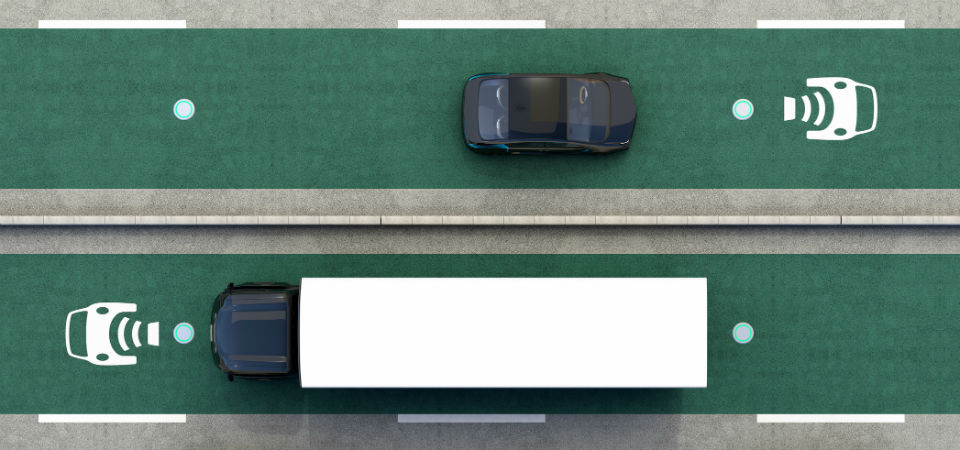27 Nov 2018
Preparing Europe for a driverless future: Loughborough leads project to smooth the transition to fully autonomous transport
 Professor Pete Thomas of the Design School
Professor Pete Thomas of the Design School
The project, named Levitate, or Societal Level Impacts of Connected and Automated Vehicles, begins on December 1, and will look at how cities, towns, regional authorities and national governments can use technology, and create new systems to accommodate the forecast growth of driverless cars, buses, taxis and pods, as well as autonomous freight and logistics.
Predictions estimate that by 2030, 25 per cent of vehicles will be completely autonomous, with the remaining 75 per cent being classed as highly autonomous – able to steer, accelerate/decelerate and monitor the surrounding environment.
In preparation for the wide-ranging impact of the transition, Loughborough University will lead a three-year EU (Horizon 2020) funded programme which aims to assess the short, medium and long-term impacts of connected and autonomous vehicles (CAVS) on mobility, safety, environment, society and other areas.
The project will address a number of questions including:
- How will autonomous vehicles improve safety, congestion and the environment?
- What are the key policy decisions to maximise the benefits and minimise negative outcomes?
- What are the mobility technologies that will give the greatest economic return?
- What alternative methods can be used to achieve the benefits of autonomous vehicles but at lower cost?
Researchers will work with nine academic and research institutions from across Europe, Australia, China and the US, as well as Transport for Greater Manchester (TfGM) and the City of Vienna.
Other supporting cities include London, Barcelona, Paris, Stuttgart, Berlin, Amsterdam and Gothenburg.
A team from Loughborough Design School (LDS) and the School of Architecture, Building and Civil Engineering (ABCE) will lead the work on impact assessment methodologies and will coordinate this exciting project.
Principal investigator of Levitate Professor Pete Thomas, of LDS, said: “The aim of the Levitate project is to help cities and regions to find the best ways to improve mobility through the increasing numbers of connected and automated vehicles.
“These vehicles bring new challenges and have the potential to disrupt mobility in both good and bad ways.
“Our job in Levitate is to provide a new scientific basis that will enable cities and regions to make policy decisions that are the best for each circumstance.”
Levitate’s four key objectives:
- Create a web-based ‘toolkit’ which helps city planners forecast the impact of autonomous mobility and design transport infrastructure accordingly
- Develop transport infrastructure scenarios, based on mobility technology, for urban shuttles, passenger cars and freight services
- Establish a method for assessing the short, medium and long-term impacts of autonomous mobility systems on mobility, safety, environment, society and other areas
- Apply the methods and forecast the impact of driverless transport in a variety of environments
Co-investigator Dr Ashleigh Filtness, also of LDS, said: “As policy decisions affect all transport modes, Levitate takes an inclusive approach considering passenger cars, city transport and freight transport.
“In each case, we will consider the short, medium and long-term impacts for the introduction of autonomous mobility.
“Our international interdisciplinary team has a broad range of skills, we are looking forward to addressing this complex problem together.”
Co-investigator Professor Mohammed Quddus, of ABCE, said: “Introduction of autonomous vehicles has the potential to make an immense impact on society in terms of enhancing road safety, facilitating efficient transport via novel mobility-on-demand services and improving air quality.
“Levitate will invent new algorithms and techniques to evaluate societal level impacts of CAV and will address a complex issue for policymakers – where and when the benefit of CAVs is going to be maximised.”
Research highlighting the potential safety benefits of autonomous systems has suggested that up to 90 per cent of crashes are associated with human error.
However, there are also a number of concerns related to the decades of transition which would be needed to fully integrate CAVS into existing transport networks.
Vehicles that are individually connected to urban traffic management systems are expected to operate more efficiently, reducing journey time and environmental impact.
Fears over inadequate control systems, problems with transfer of control between human and vehicle, and malfunctioning infrastructure would need to be addressed.
Prof Thomas said: “Additionally, it is expected that, while vehicle automation may bring an improvement in mobility for people with disabilities, it could have the effect of increasing traffic and road use by up to 14 per cent with a related additional environmental impact.
“We have a world leading partnership with the Levitate project.
“As well as having all of the leading European research groups in this field we are very pleased to be working with research institutes from Chine, Australia and the US."
The 12 partner organisations:
- Loughborough University United Kingdom (lead)
- Austrian Institute of Technology (AIT) Austria
- Aimsun Spain
- National Technical University of Athens Greece
- Cities and Regions for Sustainable Transport (POLIS) Belgium
- Dutch institute for road safety research Netherlands
- Institute for Transport Economics Norway
- Transport for Greater Manchester (TFGM) United Kingdom
- City of Vienna Austria
- Queensland University of Technology Australia
- Tongji University (TJU) China
- University of Michigan United States















